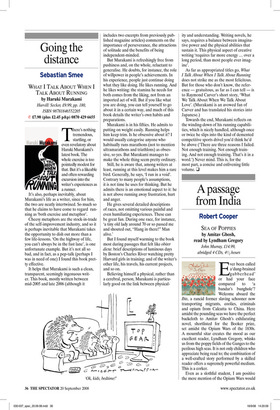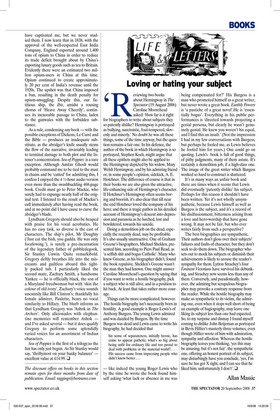A passage from India
Robert Cooper
SEA OF POPPIES by Amitav Ghosh, read by Lyndham Gregory John Murray, £14.99, abridged 4 CDs, 41/2 hours Ever been called a ‘dung-brained gubberhead’ or had your face compared to ‘a bandar’s bunghole’? Welcome aboard the Ibis, a rancid former slaving schooner now transporting migrants, coolies, criminals and opium from Calcutta to China. Here amidst the pounding seas we have the perfect backcloth to Amitav Ghosh’s exhilarating novel, shortlisted for the Booker prize, set amidst the Opium Wars of the 1830s. A mournful sitar creates the mood as our excellent reader, Lyndham Gregory, whisks us from the poppy fields of the Ganges to the perilous high seas. It is not only children who appreciate being read to; the combination of a well-crafted story performed by a skilled reader offers a supremely powerful medium. This is a corker.
Even as a slothful student, I am positive the mere mention of the Opium Wars would have captivated me, but we never studied them. I now learn that in 1838, with the approval of the well-respected East India Company, England exported around 1,400 tons of opium to China in order to reduce its trade deficit brought about by China’s exporting luxury goods such as tea to Britain. Evidently there were an estimated two million opium-users in China at this time. Opium continued to create approximately 20 per cent of India’s revenue until the 1920s. The upshot was that China imposed a ban, resulting in the death penalty for opium-smuggling. Despite this, our fictitious ship, the Ibis, amidst a rousing chorus of ‘Heave Away Cheerily’, continues its inexorable passage to China, laden to the gunwales with the forbidden substance.
As a rule, condensing any book — with the possible exceptions of Dickens, Le Carré and the Bible — produces an inadequate substitute, as the abridger’s knife usually stems the flow of the narrative, invariably leading to terminal damage to both plot and the listener’s concentration. Sea of Poppies is a rare exception. Although Amitav Ghosh would probably command me to be tied to the mast in chains and be ‘catted’ for admitting this, I confess I enjoyed the 4 1/2-hour audio version even more than the swashbuckling 468-page book. Credit must go to Peter Mackie, who surely had to expunge nearly half of the original text. I listened to the result of Mackie’s cull immediately after having read the book, and at no point did I have cause to curse the abridger’s blade.
Lyndham Gregory should also be heaped with praise for his vocal acrobatics. He has no easy task, so diverse is the cast of characters. The ship’s pilot, Mr Doughty (‘Just eat the bish, you gudda. He was only foozlowing.’), is surely a pre-incarnation of the legendary father of gobbledegook, Sir Stanley Unwin. Quite remarkibold. Gregory deftly breathes life into the miscreants and guiltless aboard this tightly packed tub. I particularly liked the second mate, Zachary Smith, a handsome Yankee — he is officially black, the son of a Maryland freedwoman but with ‘skin the colour of old ivory’. Zachary’s voice sounds uncannily like Bill Clinton’s; thankfully his female admirer, Paulette, bears no vocal similarity to Hillary. The blurb informs us that Lyndham Gregory was ‘Ashok in The Archers’. Only aficionados with elephantine memories will remember Ashok — and I’ve asked several — but it does qualify Gregory to perform some splendidly varied voices for an assortment of Indian characters.
Sea of Poppies is the first of a trilogy;so the fun has only just begun. As Sir Stanley would say, ‘thriftymost on your banky balancer’ — excellent value at £14.99. ❑











































































 Previous page
Previous page